Termites are a homeowner’s nightmare, capable of causing extensive structural damage to your property. These invasive insects can be difficult to detect and even harder to get rid of once they’ve established a colony. With the various methods of termite control available on the market, it’s natural to wonder if unconventional approaches like using oil could be effective in exterminating these pests.
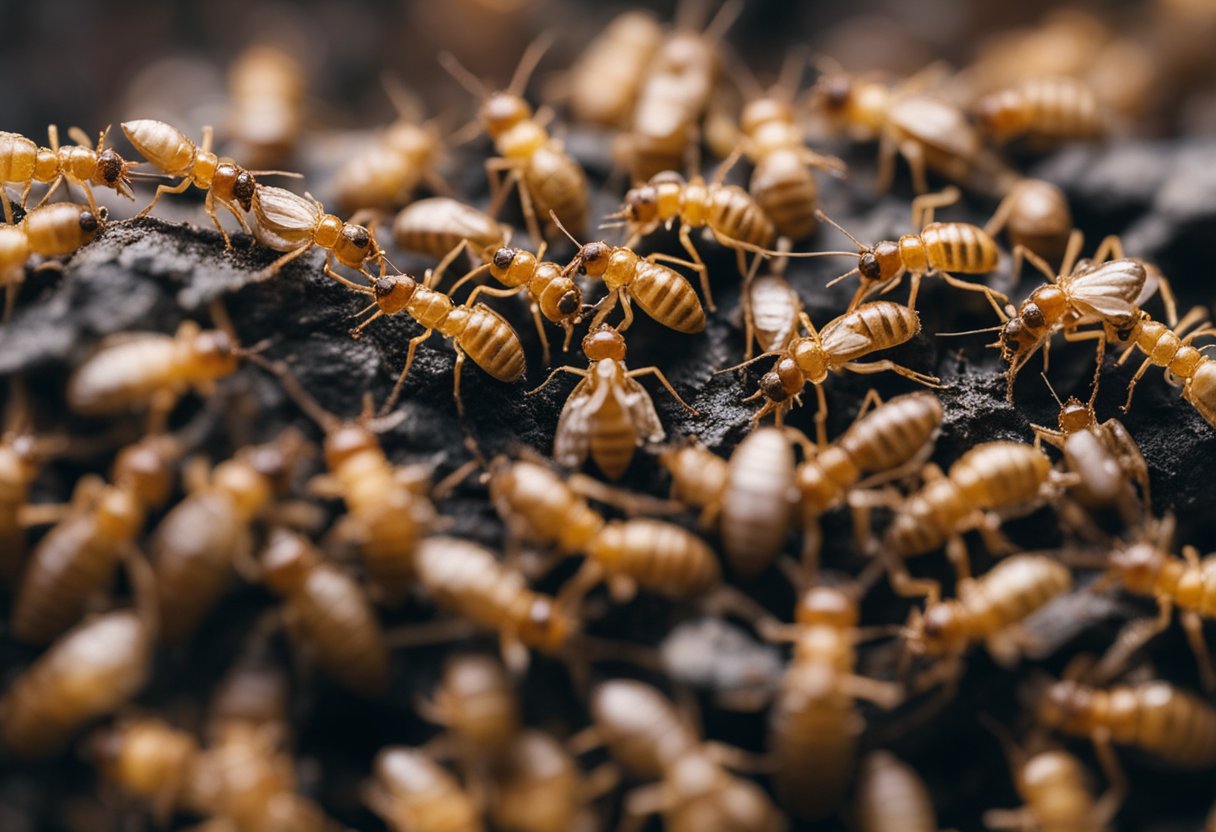
Oil, particularly certain essential oils, has been tested in the past for its potential to kill termites. While it may not be the most conventional method for termite control, some studies suggest that certain oils have properties that can effectively kill termites upon contact. Considering these findings, it’s worth exploring the potential of oil-based solutions to address termite infestations, keeping in mind their limitations and the importance of understanding termite behavior and life cycle.
Key Takeaways
- Certain essential oils may have the potential to kill termites upon contact.
- Understanding termite behavior and life cycle is crucial for effective termite control.
- A combination of methods, including oil-based solutions, may be necessary to fully address a termite infestation.
Understanding Termite Behavior and Life Cycle
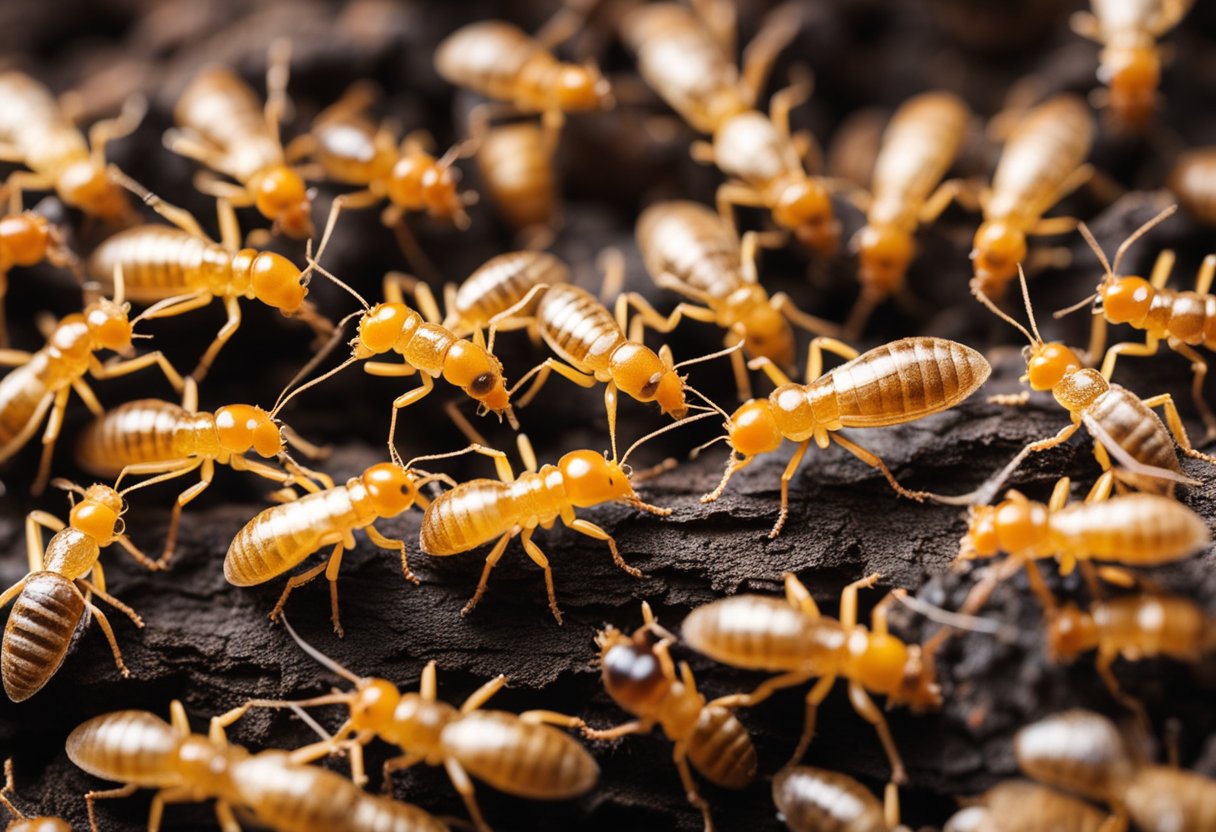
Termites are fascinating insects that are commonly mistaken for ants due to their similar size and shape. However, termites differ significantly in their behavior and life cycle. As you learn more about these creatures, you’ll be better equipped to understand how they interact with their environment, including the role that oil might play in dealing with termite infestations.
First, let’s discuss termite reproduction. Termites reproduce through a process called swarming, during which winged individuals called alates take flight in search of a suitable location to establish a new colony. Once these alates land and shed their wings, they become the king and queen of the new colony. You may often find discarded wings near your property, which could indicate the presence of termites.
In comparison to ants, termites have a few distinguishing features. For instance, termites possess straight antennae, whereas ant antennae are elbowed. Additionally, termites have thicker waists and a more uniform exoskeleton, while ants have a clearly defined segmentation between their thorax and abdomen.
Now, let’s explore termite behavior. Termites are skilled builders and create mud tubes to travel to and from their food sources while remaining protected from predators and unfavorable weather conditions. These mud tubes indicate the presence of termites, and their destruction is crucial for termite control.
In combating termite infestations, it’s important to understand their feeding preferences. Termites primarily feed on cellulose, which is a component of wood and plant materials. Consequently, they can cause extensive damage to your property. To manage termites effectively, various methods are used, including termite bait that contains toxins to eliminate the colony.
Overall, understanding termite behavior and life cycle will help you tackle termite infestations more efficiently and determine whether oil could be an effective solution for eliminating these insects.
Methods of Termite Control and Their Effectiveness
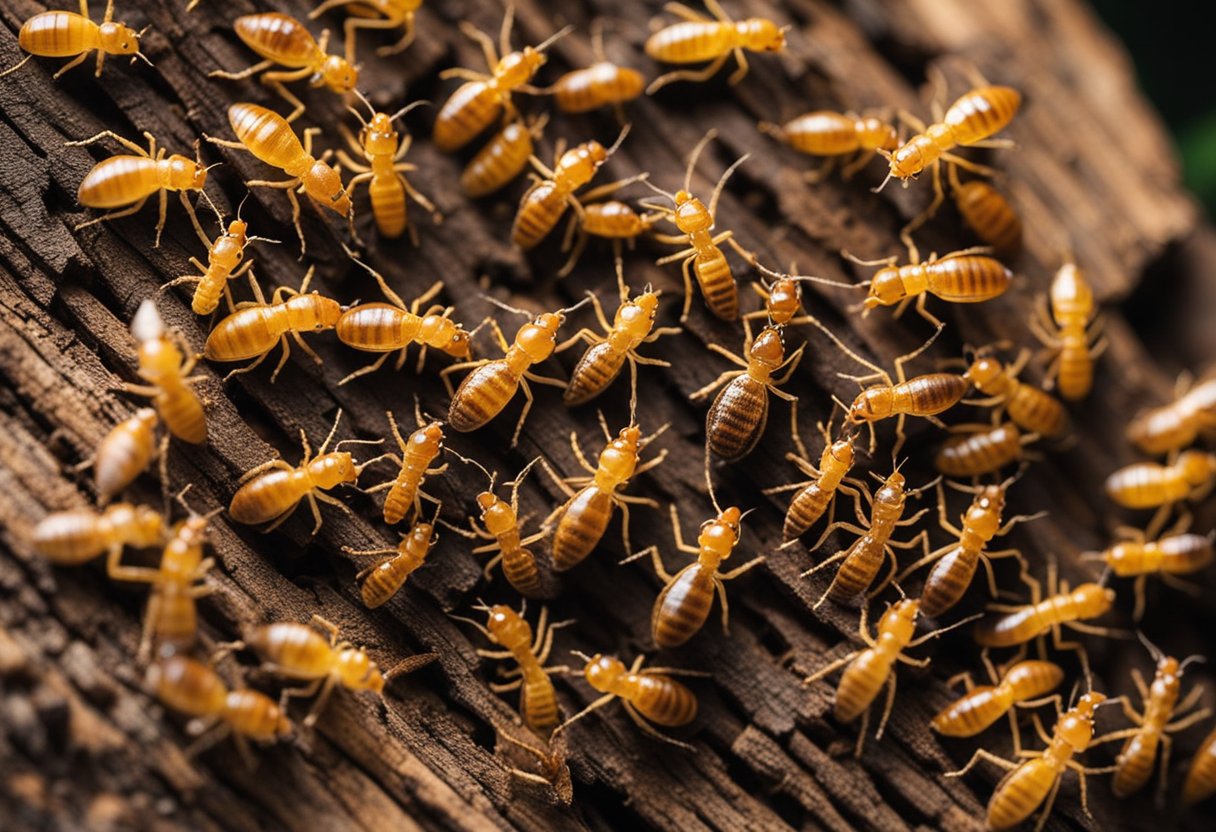
Professional Pest Control Approaches
Professional pest control companies like Terminix and Orkin offer a variety of termite treatment options for homeowners. These treatments often involve the use of insecticides such as Taurus SC or Fipronil, which create a barrier around your home, preventing termites from entering.
Another common method is the installation of termite baits that contain toxic substances like hexaflumuron or imidacloprid. When termites consume these baits, it leads to their eventual death. Pest control professionals may also use liquid treatments, which involve drilling holes around the home and injecting chemicals directly into the soil. These liquid termiticides, like non-repellent chemicals, can be very effective in controlling termite infestations.
DIY Termite Control Methods
If you prefer to tackle termites on your own, several DIY methods are available. One option is using food-grade diatomaceous earth, which can be spread around your home as a barrier. When termites come into contact with this substance, it causes damage to their exoskeleton, eventually leading to their death.
Baiting systems are another option, and you can create your own termite bait by mixing boric acid with a cellulose-based food source like cardboard. Wet pieces of cardboard can also be used as a simple trap, attracting termites and making it easier for you to remove them from your property.
Natural solutions like essential oils can be helpful in controlling termites. Orange oil, neem oil, peppermint oil, and clove oil can be applied using a spray bottle around your home to deter termites from your property. However, it’s important to remember that these oils may not kill termites outright.
Another option is the use of beneficial nematodes, which are microscopic worms that feed on termites. Make sure to research and purchase nematodes that are specifically targeted towards termites for maximum effectiveness.
Keep in mind that while DIY methods can be helpful in controlling termites, their effectiveness may not match that of professional pest control approaches. For more severe infestations, it’s advisable to consult with a pest control company or exterminator to ensure the most thorough and efficient treatment possible.
Preventative Measures and Regular Inspections
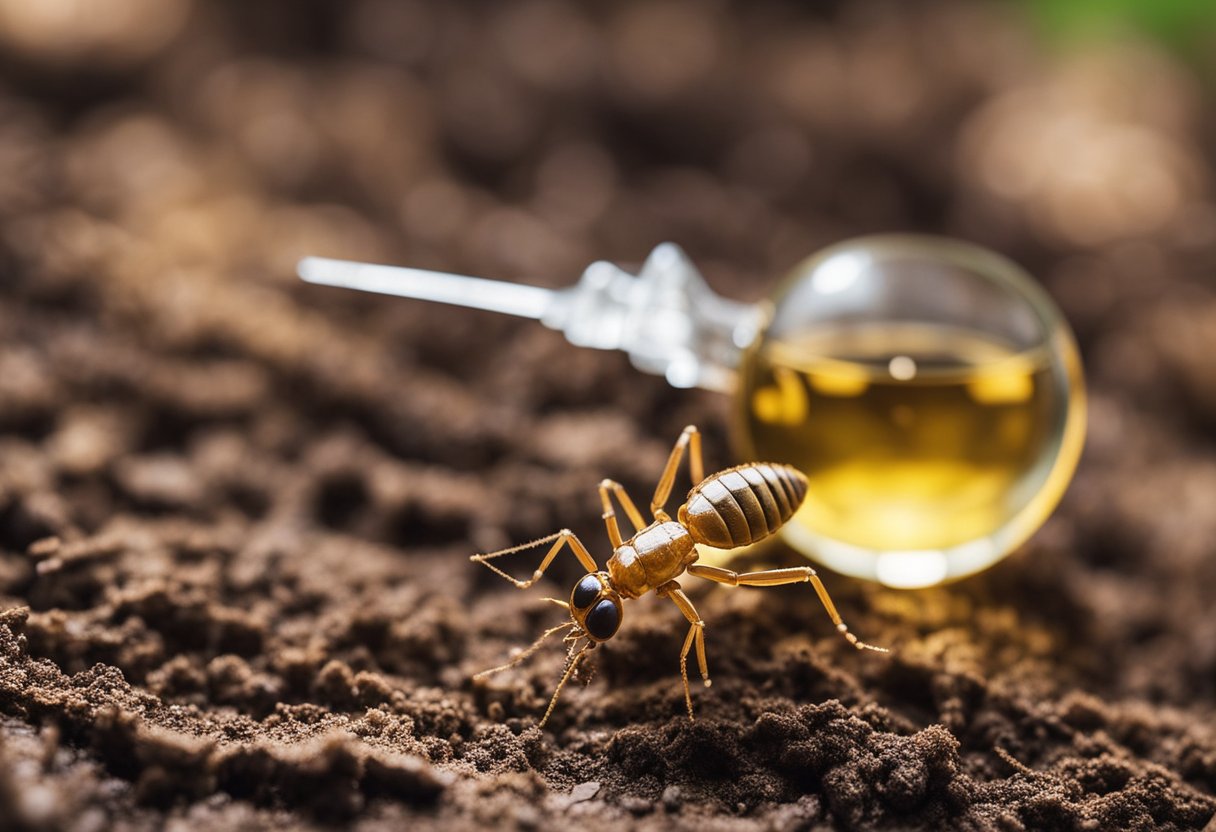
To protect your home from termites, one of the most effective strategies is to implement preventative measures and conduct regular inspections. By doing so, you can address any potential termite problems before they become a significant issue.
Firstly, it’s essential to maintain proper moisture levels in your home. Termites thrive in damp environments, so ensure that your home is well-ventilated and free from any leaks or water damage. Moreover, don’t let laundry or damp items accumulate in one area for too long, as this can create a favorable habitat for termites.
Preventative measures like spot treatment can be an effective way to target specific areas where termites may be present. By applying termite-resistant products to cracks and crevices, you can limit their access to your home. Keep an eye out for peeling paint or damaged wood, as these are often signs of termite infestations.
Regular inspections are crucial in identifying the presence of termites early on. Inspect your home’s foundation, particularly if it’s made of concrete, for any signs of termite damage. This could include tunnels built by termites or even termite droppings. Don’t forget to wear gloves when conducting these inspections, as some termite species may pose risks to your skin.
By taking these steps, you can actively ensure the safety and security of your home from termite invasions. Remember, prevention is always better than cure, so make sure to invest both time and effort in maintaining a termite-free environment for your property.
Consideration of Safety and Environmental Impact
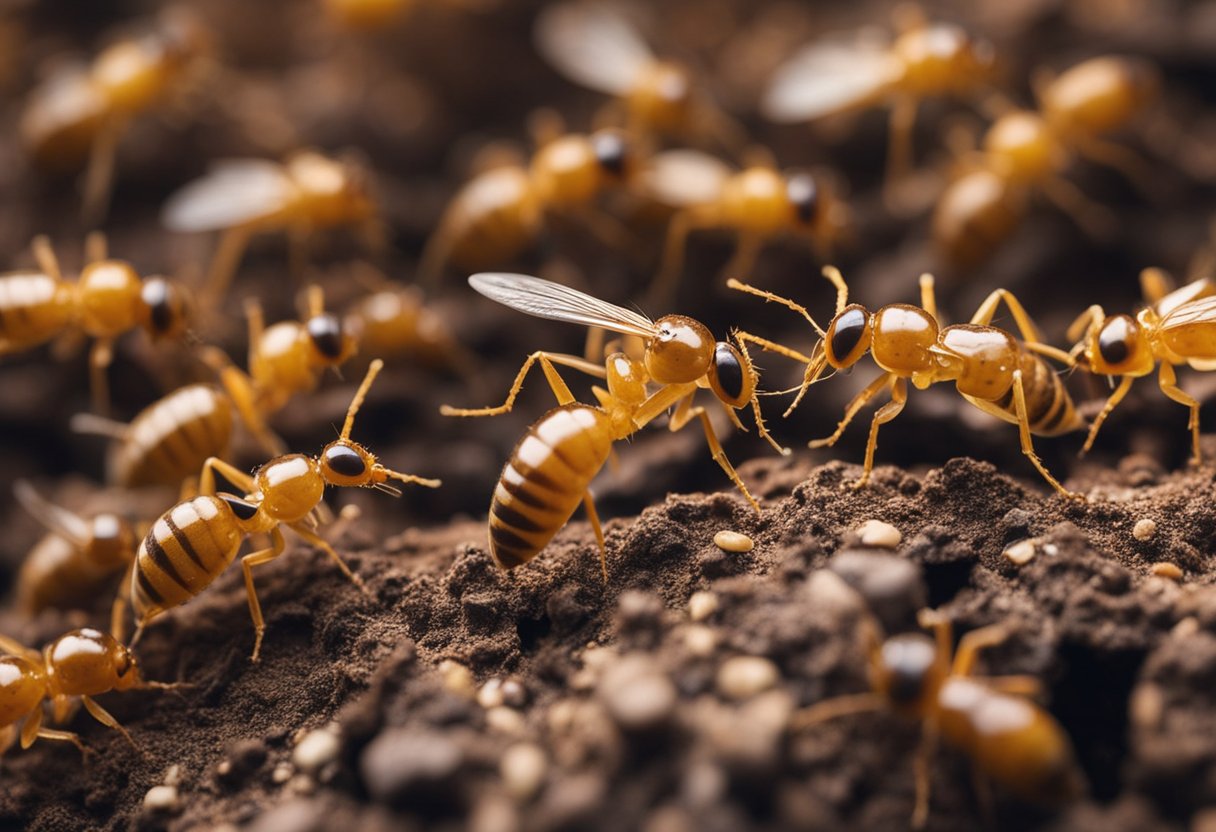
When dealing with termites, it’s essential to consider the safety and environmental impact of the treatment methods you choose. Using oil to kill termites might have implications on your food, pets, humans, and the eco-system.
There are some natural remedies that can be less harmful to your surroundings. For instance, using essential oils like orange or neem oil can be an eco-friendly option with minimal negative impact on the environment. These oils contain active ingredients that can dehydrate the termites, subsequently killing them. While these methods have some advantages, it’s also important to be mindful of the possible drawbacks. Here’s a quick overview of the pros and cons:
Pros:
- Natural and eco-friendly
- Generally considered safe around food and pets
- Can target specific termite species
Cons:
- May not be as effective as chemical treatments
- Might require multiple applications
- Limited to localized termite infestations
Another alternative to consider is the use of biological control agents like roundworms, which are predatory parasites that can effectively target and eliminate termite colonies. This method can be considered safer and more environmentally friendly than traditional chemical treatments.
Ensure you are sufficiently informed about the active ingredients in the treatment methods you select, as well as their potential effects on your surroundings. While using oils to kill termites might provide some benefits in terms of safety and eco-friendliness, it is essential to weigh these advantages against the possible drawbacks and limitations in effectiveness.
In conclusion, various treatment methods, including oil-based solutions, have their own unique set of advantages and potential concerns. Always consider the safety and environmental impact when selecting appropriate termite elimination methods for your situation.

